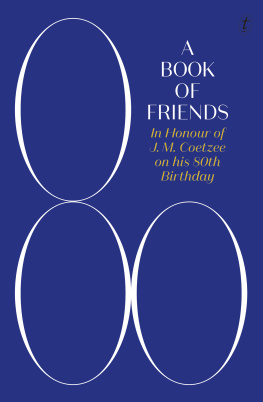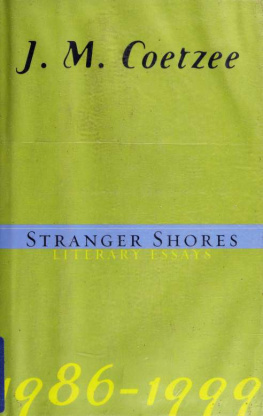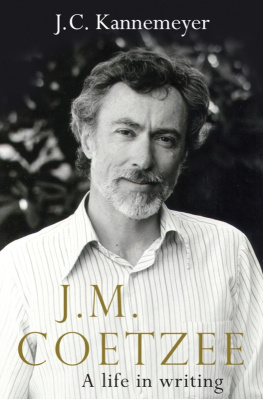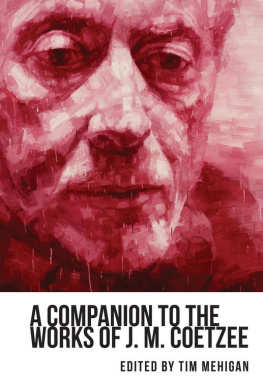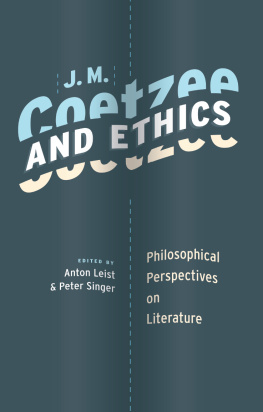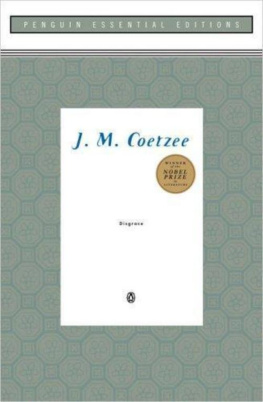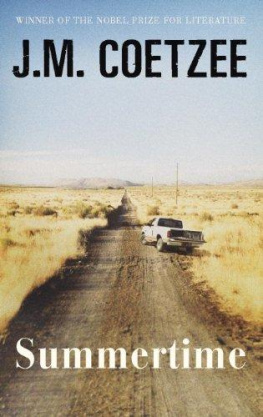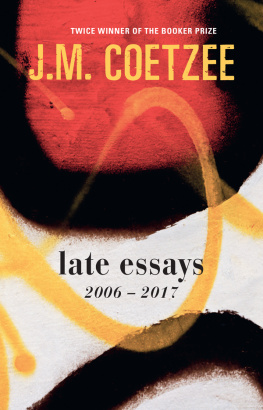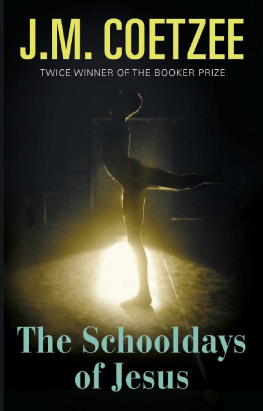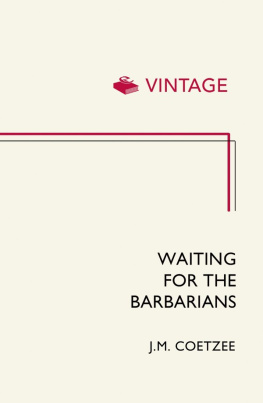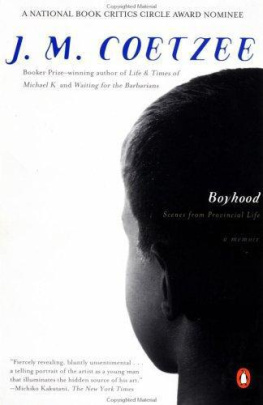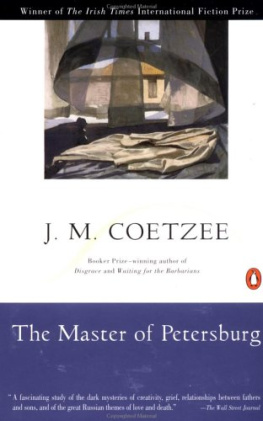A Book of Friends is a collection of essays, stories, poems and artworks compiled in honour of J. M. Coetzee on his eightieth birthday. It includes contributions from some of Coetzees friends and contemporaries, and is edited by Dorothy Driver, his partner over the past four decades.
Stretching from the Americas to South Africa to Australia, A Book of Friends pays homage to friendship, literature and the work of one of the most extraordinary writers of our time.
Contents
A Book of Friends is a gift to John Coetzee on his eightieth birthday. Its not simply a tribute to him, as writer and thinker, in the oblique, complimentary manner of the Festschrift, although it is certainly that too. Rather, it is a gift of love, from myself, its editor and his life-companion over four decades, and from a few of those whose creative work and conversations John has admired and enjoyed in the regions where he has lived or worked.
There might have been many other contributors: my knowledge of and access to the creative and intellectual figures John has had close contact with over the years is inevitably partial, and in a few cases has been gleaned from others. The book includes essays, stories, poems, extracts from fiction and non-fiction, and graphic material, a miscellany of contributions that in one way or another engage with Johns varied interests or otherwise speak to a particular association. Mingling regions and genres, the book crosses yet another boundary by including two of David Coetzees works of art, which John encountered for the first time shortly before his brothers death.
Almost all the writing and images in A Book of Friends appear for the first time in this form. My profound thanks to the contributors for donating their work, as well as to Michael Heyward and Text Publishing for producing the book, and to Nicholas Jose for his unstinting encouragement and advice. Any royalties will go to non-profit organisations.
I first heard of J. M. Coetzee in the early 1980s when a friend gave me a copy of Waiting for the Barbarians. I do not think it retrospective fantasy to say that I can remember the experience of first reading it. I was shocked and taken aback and pulled in. I felt I was in the presence of truth. Not truth in the sense of getting the facts right, but truth in the sense of getting to the essence of the thing, of getting to the bottom of something, of ringing true. It was menacing. It seemed to me that the author must have suffered to put this image of evil into words. The author wanted to know how evil works in the human soul: how some can know and not know that they are participating in it, and others can wholeheartedly embrace it. He was not after merely theoretical but also practical and emotional understanding. And he wanted, insofar as he could, to communicate that understanding to his readers. Reading Waiting for the Barbarians puts pressure on ones ability to tolerate truth. In the case of evil, getting to the bottom of things meant coming to recognise there was no bottom. The book had historical specificityin some sense, it was about apartheid. But it captured a fearful fantasy about others that, unfortunately for us, seems to be timeless and contagious. Throughout the country todayand in countries all over the worldwe are waiting for the barbarians. And we regularly assume not only that others are the barbarians, but that it is others who are doing the waiting. I have read that book repeatedly over the decades and my first experience has only been reinforced: this is a classic.
In the mid-1990s, John Coetzee joined the Committee on Social Thought, and we became colleagues and then friends. I would like to share with you two impressions of meeting him because they are so at odds with the public image. First, I have rarely met someone so open, so welcoming, so ready to talk, so generousyet shrewd, blunt, honest and to the point; yet ready to have a good laugh. Our friendship was effortless. Second, I have rarely met someone so committed to students. Teaching, for him, was an affair of the heart as well as an ethical commitment.
So how could it be that John is publicly inscribed as reclusive? I have come to think the situation is simple: the false image is a distortion of something true. John knows what we ourselves already know, only he knows it better: that we are alive for a while. He bears better than most the knowledge that we are going to be dead for a long time. And though I do not want to identify him with any of his characters, I believe that he, like Elizabeth Costello, has a sympathetic imagination that can extend so far as to know what it is likethat is, to experiencebeing dead, extinct, no longer capable of experience. His life is an extraordinarily crafted answer to the question: what are we going to do while alive? He wants to understand how things are: what we humans are like, what animals are like, what numbers and mountains, music, spirits and children are like. And what ethical commitments spring from all that? His life is a witness to what he has learned and is learninga life in literature and literary criticism that shines out to its readers and pulls us in with all the light and dark, the intensity, of a series of Rembrandt self-portraits. I think the comparison to Rembrandt is apt: for disciplining a craft to express an understanding of life and death.
I think this understanding provides a key to the false public image. John is not reclusive but he is impatient with living in clichs. Quite literally, impatient: he does not have time for it. And thus he does turn away from hollowed-out rituals that themselves turn us away from our inbuilt awareness of life and its preciousness. This reluctance to participate in distractions has itself been transformed into fake news: the clich of being reclusive. I suppose he is also clichs enemy. Clich and fashion provide a route by which we pretend to ourselves that we know what we do not know and, when it comes to evil, that we do not know what we do know. When one thinks of authors who have influenced Coetzee one regularly thinks of Defoe, Dostoyevsky and Kafka. I also think of Plato, who I suspect lies at the heart of it all.
Now when it comes to living in clichs, John and I had one close call. In October 2018 it fell to me to introduce John when he came back to the University of Chicago to deliver a lecture, Growing Up with the Childrens Encyclopedia. Is there anything more constrained and overly familiar than an academic introduction? Indeed, you can find excruciating accounts of such occasions in Elizabeth Costello. I dealt with the problem by deciding that my job was not to introduce John, but to welcome him back. That turned out to be a complex and emotionally demanding task. On the one hand there was the joy of remembering those years of teaching Dostoyevsky and Tolstoy and Proust and Plato together, in the company of students and colleagues. In those days I felt there was no gap between what we were doing and what we ought to be doing. But on the other hand, in remembering, there was also the recognition that I was remembering: that time is over. And in the joy in welcoming him back I also recognised that part of what it is to welcome him back is to acknowledge that he left. And he left because he had other things, in his eyes better things, to do. I embraced his decision and our friendship has survived and deepened and taken its own route. But welcoming John back was anything but a clich for me.

